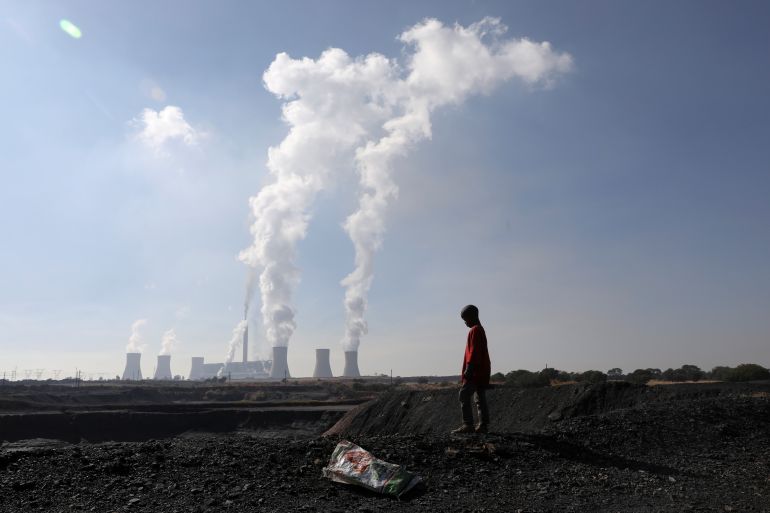South Africa needs $250bn for clean energy transition: Report
Approximately half of the funding required is needed to ramp up wind and solar power projects as the country mothballs coal-fired plants, new publication says.

Moving South Africa’s coal-dominated economy to a greener footing will require at least $250bn over the next three decades, according to a new report released on the sidelines of the World Economic Forum in Davos.
The document published on Thursday was produced by academics at South Africa’s Stellenbosch University and the Blended Finance Taskforce, a body set up in 2017 to help mobilise large-scale private capital in a bid to end poverty in line with the United Nations’ Sustainable Development Goals.
Keep reading
list of 4 itemsSouth Africa: Kwa-Zulu Natal community fights coal mine expansion
The COP26 deal will not be enough to end SA’s coal addiction
In Pictures: The plight of South Africa’s informal miners
It said about half of the total investment, $125bn, will be needed to ramp up wind and solar power projects as the country mothballs coal-fired plants that currently supply most of its energy needs.
“It will take at least $250 billion spent over the next three decades to transition to a low-carbon, more equitable energy system in South Africa under an ambitious decarbonisation scenario [coal off by 2040],” the report said.

South Africa is the world’s 13th biggest emitter of climate-warming gases and the biggest in Africa, according to the Global Carbon Atlas, a project tracking countries’ emissions data.
In November, Britain, France, Germany, the United States and the European Union agreed to offer an $8.5bn package to help South Africa switch to a low-carbon economy, although exact details and timelines are still being discussed.
Besides building up renewable projects and infrastructure, the funding is also earmarked for gas plants and new transmission lines.
It will also ensure that potentially tens of thousands of coal workers whose jobs are threatened will be reskilled, a thorny issue for the government and the labour unions.
South Africa’s official current unemployment stands at a record high of 35.3 percent and energy minister Gwede Mantashe has likened replacing coal-fired plants too swiftly to “economic suicide”.
“Aligning the right type of capital with the right investments and costs is key to meeting South Africa’s just energy transition objectives,” the report said, adding that the definition of “just” should extend beyond workers to address the challenges of communities in coal-dependent areas.
Its publication comes as South Africa is currently suffering nationwide rolling power cuts because its coal-fired power stations are unable to generate enough electricity to meet demand.